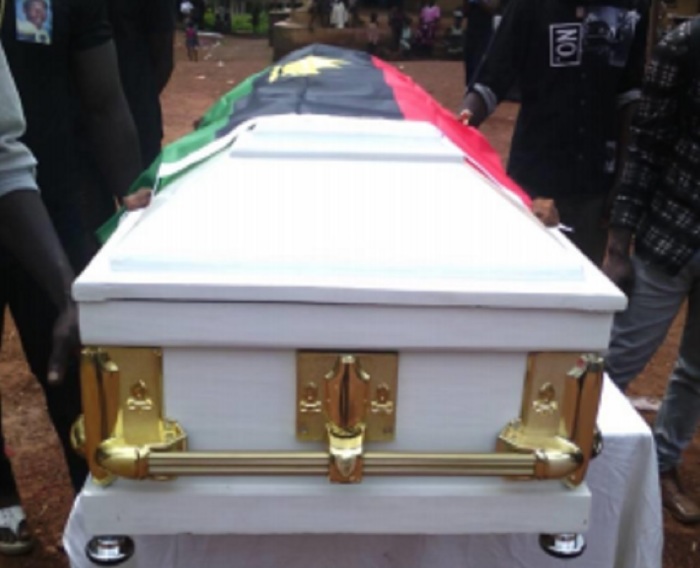Nigerian Christian student killed, 2 villagers abducted by suspected Fulani radicals

A Christian college student was reportedly shot and killed by radical Fulani herdsmen during a raid on a village in the Nigerian state of Kaduna last Thursday, about a week after a pastor was stabbed to death in his church in southern Nigeria.
Residents of the Gbagyi Villa of the north-central state of Kaduna told the nonprofit persecution media outlet Morning Star News that Federal Polytechnic student Sebastine Stephen was shot and killed around 11:30 p.m. last Thursday.
According to residents, Stephen was visiting his home village in the Chikun local government area because classes at his college in Zamfara state have been suspended due to the global coronavirus outbreak.
Stephen was reportedly outside at around when suspected Fulani herdsmen raided the village.
“Stephen raised alarm, warning residents about the invasion of our community as he was still outside at the time the herdsmen came to attack the community,” resident Hosea Yusuf told Morning Star News.“The herdsmen instantly shot him and then proceeded to enter one of the houses close to them, where they kidnapped a couple.”
The gunfire that killed Stephen further alerted other residents to flee.
“They were shooting randomly at residents while retreating because the alarm raised by Sebastine had attracted the attention of the other residents, who in turn alerted security agencies,” area resident Sunday Musa told the news outlet.
Another resident, Chris Obodumu, said that the attackers were armed with “sophisticated” weapons.
After killing Stephen, the attackers were said to have broken into the house of Jack Nweke. Nweke and his wife, who have three children, were abducted.
Community leader Martins Emmanuel said that night, Fulani militants also attacked the nearby area of Mararaban Rido.
Stephen’s killing comes as thousands of people from predominantly Christian farming villages throughout Nigeria have been killed in recent years by attacks carried out by groups of nomadic Fulani radicals.
On April 10, two suspected Fulani radicals reportedly killed Pastor Stephen Akpor of the Celestial Church of Christ in the Aniocha North local government area of the southern Delta state. According to the Nigerian daily newspaper Vanguard, the attack occurred around 8:30 p.m. while the pastor was counseling five members of his congregation.
Sources told the newspaper that Akpor leaves behind a wife and five children.
“He [was] gunned him down through the window,” one witness told Vanguard. “Before the police got here and took him to the General Hospital, Ibusa, he gave up the ghost.”
A doctor who spoke with Vanguard confirmed to the news outlet that the deceased pastor was also stabbed after he was shot and that he died as a result of the stab wounds.
Onome Onovwakpoyeya, a local police spokesperson, told Vanguard that an investigation has begun into Akpor’s death.
Nigeria ranks as the 12th worst country in the world when it comes to Christian persecution, according to Open Doors USA’s 2020 World Watch List.
The International Society for Civil Liberties & Rule of Law estimates that at least 400 Christians have been killed in 2020 alone by Fulani herdsmen.
So far in April, several Christians have reportedly been killed by suspected Fulani radicals.
Intersociety estimates that at least 11,500 Christians have been killed since 2015 by Fulani herdsmen, Boko Haram militants, and highway bandits. The nongovernmental organization reported in March that at least 20 clergymen have been killed and no less than 50 religious leaders have been kidnapped during that time.
Last Friday, an Anglican pastor along with his wife and kids in the Delta state was reportedly kidnapped by suspected Fulani herdsmen. A local source that spoke to Vanguard explained that the wife and children were released with the order to get money to pay ransom for Rev. Anthony Oyi.
Nigeria is also listed on the U.S. State Department’s “special watch list” for countries that engage in or tolerate “severe violations of religious freedom.”
The U.S. Ambassador-at-Large for International Religious Freedom Sam Brownback told reporters last December that Nigeria was placed on the list for the first time because of “the increasing violence and communal activity and the lack of effective government response and the lack of judicial cases being brought forward in that country.”
Because of attacks on predominantly Christian farming communities by predominantly Muslim Fulani herdsmen throughout Nigeria, thousands have been displaced from their homes and farms in the last five-plus years in Middle Belt states like Plateau, Benue, Taraba, and Kaduna.
While the violence in the middle belt between predominantly Muslim Fulani herdsmen and predominantly Christian farming communities has largely been described as “farmer-herder” clashes, advocates for displaced Christian communities argue that such terminology is not quite accurate.
“Initially, it was termed ‘communal [farmer-herder] clash,’ and little or nothing was known about it. People [of the village] would always come out, form a vigilante group and help defend themselves,” Elizabeth Duile of Agatu Resource and Innovation Center in the Benue state told CP recently.
“So it would just end up [seeming] like there was an ethnic clash and all of that. And for a long time, it was termed as so until 2016, when 10 of Agatu’s 17 villages were overrun at the same time. That was when hundreds of people were killed. And there was a need to let the world hear what was happening.”
“If we keep calling them herdsmen, that [just feeds the narrative] of a communal clash,” she continued. “It's more wanting to take over the community, not just herders coming to feed their cattle. … So It became more of a full-blown war and not just coming to feed, or graze.”
International human rights groups Jubilee Campaign and Christian Solidarity International have both indicated that the level of violence against Christians in Nigeria has risen to the level of genocide.
Follow Samuel Smith on Twitter: @IamSamSmith
or Facebook: SamuelSmithCP



























